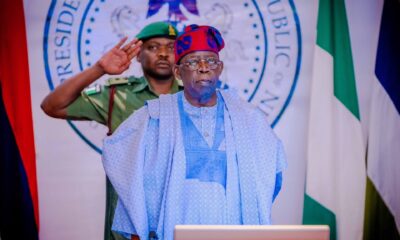Opinion
Nigeria Needs A Redeemer

For the past sixty years when Nigeria was born by way of gaining political independence, not much positive change has been achieved. Instead corruption has eaten deep into the fabrics of almost all sectors of the nation. No constant electricity, pipe-borne water, health care, low standard of education, unemployment and so on.
As an adult residing in this part of the country the events in the world at large and Nigeria in particular, deemed it very necessary for a saviour to come to Nigeria.
At the arrival of a saviour to Nigeria, every existing authority and constitution should be suspended. A concrete reformation of several issues plaguing the nation shall be handled. The constitution as it is now has not benefited the people. The constitution favours the few in government to enrich themselves and oppress and suppress the citizens. The current constitution has outlived its usefulness.
Nigeria’s electoral system shall be amended and reformed. Electoral law that exists today cannot allow for free and fair election. The chairman of the electoral body should not be appointed by the president anymore. The Supreme Court judges shall elect the electoral umpire whose tenure should be once to avoid being corrupt.
Moreso, the judiciary as one of the engines of government shall remain absolutely independent. The three tiers of government shall be independent, mostly the local government. Unicameral legislature should be adopted. The salaries and allowances of those in the corridors of power should also be slashed to the barest minimum.
The economy should be streamlined; agriculture is to be given a face-lift in the annual budget. Manufacturing industries should be set up in each local government of the federation to lessen the escalating youth unemployment. The importation of premium motor spirit otherwise known as petrol shall cease forthwith as new refineries are being built and old ones revitalized to ensure full production.
Since creation, God had let light be which is to say strong power stations will be built in all local areas to generate and transmit electricity to the nation. This will be uninterrupted.
Water pipes will go round the cities and towns and remote areas for supply of clean water. Enough bore-holes as the only source of water in Nigeria.
Education as the bed-rock of any development shall be free from primary to tertiary institutions. Government is to fund education to meet international standard. Technology and skill acquisition should be made to serve and solve problems of mankind peculiar to them. Government can do very much to recognize talented citizens and give them attention and chance to dwell in the areas of their calling and purpose.
Nigeria has men and woman endowed with wisdom, knowledge and understanding of how things work. Therefore, indigenous technology shall be encouraged. I have heard about people, our brothers and sisters in Nigeria, who manufactured or rather produced, for instance, electricity through waste products, modular refinery, cable wire, drugs and so on.
The question that is begging for an urgent answer is: why did we sell our talents to foreign nations of the world! Some Nigerian doctors are specialists overseas; some professors are the best researchers all over the world. The same is also applicable to others in the fields of business and arts.
Some government policies found inimical to the citizens shall cease to exist. Extra charge from mobile communication companies in the name of VAT, high cost of petroleum products, multiple taxes, age barrier among citizens seeking for job or the limit placed against career and profession.
On the other hand, since politicians are not limited to any age; why must other taxpayers be restricted by age. Retirement in the civil service should be based on years of service instead of individual age at either 60, 65 or at most 70 years old as it is now. This is to eliminate age falsification among the workforce. A minor reduction can be adequately done in the length of service and gratuity and other fringe benefits paid at once to the beneficiary.
Government should, as a matter of urgency, provide enabling environment for trade and investment from foreign countries. And allow new investors to enjoy some years of tax holidays. If this is done and achieved, jobs can be created for the youths thereby curtail crime in society.
Government at all levels should henceforth stop borrowing from within and outside the country because most of the loans are not unaccounted for. Borrowing without actualizing the purpose is mismanagement and corruption. The future of unborn children could be mortgaged. Too much borrowing has created more and more poverty in most households. And no one has the immediate solution to it. Basic infrastructures are not visible. Citizens ought to demand for accountability from government.
Meanwhile, a chronic disease has prohibited Nigerian politicians from travelling abroad as well as caused some Nigerians living abroad to return unexpectedly. It is amazing! The image of the country is nothing to write home about due to the corrupt intent of some mischievous elements.
During my days in primary school, I learnt about natural resources found in some states such as former Bendel State-timber; Enugu – coal; South-Western States-cocoa. What happened to the untapped resources?
For now, no doubt, Nigeria still looks for a man or woman who, by wisdom and knowledge, will use the resources to develop and grow the economy of this nation. She needs a saviour now more than ever before. God help us.
Eze wrote from Port Harcourt.
Paul Eze
Opinion
Ndifon’s Verdict and University Power Reform

Opinion
As Nigeria’s Insecurity Rings Alarm

Opinion
The Girl Who Didn’t Dance
-

 Featured5 days ago
Featured5 days agoOil & Gas: Rivers Remains The Best Investment Destination – Fubara
-
Nation5 days ago
MOSIEND Calls For RSG, NDDC, Stakeholders’ Intervention In Obolo Nation
-

 News5 days ago
News5 days agoNDLEA Arrests Two, Intercepts Illicit Drugs Packaged As Christmas Cookies
-

 News5 days ago
News5 days agoTroops Rescue 12 Abducted Teenage Girls In Borno
-

 News5 days ago
News5 days agoInvestment In Education Remains Top Priority For Gov Fubara – SSG
-

 News5 days ago
News5 days agoChina Alerts Rivers, A’Ibom, Abia Govs To Economic Triangle
-

 Featured5 days ago
Featured5 days agoLady Fubara Lauds Rivers Women On Peace, Development
-

 News5 days ago
News5 days agoTinubu Nominates Ex-INEC Chair Yakubu, Fani-Kayode, Omokri, 29 Others As Ambassadors

